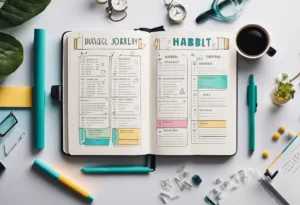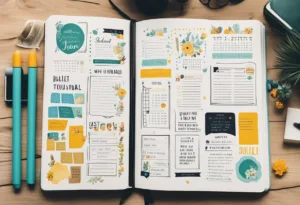Bullet journaling has become increasingly popular in recent years, and for good reason. It is a simple and effective way to stay organized and keep track of important tasks and goals. However, starting a bullet journal can be overwhelming for beginners who may not know where to start. Fortunately, there are many easy bullet journal ideas that can help anyone get started on their journaling journey. In this blog post, I will share with you 45 easy bullet journal ideas to help you get started with bullet journaling.
One of the great things about bullet journaling is its flexibility. There are no hard and fast rules, and each person can customize their journal to fit their own needs and preferences. Some easy bullet journal ideas include creating a daily to-do list, tracking habits and goals, and using color coding to keep different tasks and categories organized. Many people find it helpful to include inspirational quotes or images in their journal to keep them motivated and inspired.
Whether you are looking to get more organized, improve your productivity, or simply express your creativity, bullet journaling can be a great tool to help you achieve your goals. With these easy bullet journal ideas, anyone can get started on their own journaling journey and experience the many benefits that come with this simple and effective organizational method.
Getting Started with Bullet Journals
Bullet journaling is a popular way to stay organized, plan your day, and track your progress. If you are new to bullet journaling, it can be overwhelming to know where to start. The following subsections will help you get started with bullet journaling.
Choosing Your Bullet Journal
The first step in starting a bullet journal is to choose a notebook that fits your needs. When choosing a notebook, consider the size, binding, and paper quality. A popular choice for bullet journaling is a notebook with dotted pages, which allows for flexibility in creating different layouts. Some bullet journalers prefer a notebook with a hardcover to protect their pages.
Understanding the Bullet Journal System
The bullet journal system is a method of organizing tasks, events, and notes in a customizable way. The system is based on symbols that represent different types of entries. For example, a dot represents a task, a circle represents an event, and a dash represents a note.
The system also includes an index, future log, monthly log, and daily log. The index is used to keep track of where different topics are located in your bullet journal, while the future log is used to plan future events. The monthly and daily logs are used to plan your month and day, respectively.
Basic Supplies for Bullet Journaling
To get started with bullet journaling, you will need a few basic supplies. These include a notebook, pen, and ruler. Some optional supplies include markers, stickers, and washi tape. Markers can be used to add color and highlight important information, while stickers and washi tape can be used to decorate your pages. It is important to note that while these supplies can enhance your bullet journaling experience, they are not necessary for getting started.
Choosing the right notebook, understanding the bullet journal system, and having basic supplies are key to getting started with bullet journaling. By following these tips, you can start creating a personalized system to help you stay organized and productive.
Easy Bullet Journal Ideas
Bullet journals are a great way to keep track of daily tasks, goals, and habits. Here are 15 easy bullet journal ideas that anyone can try:
Daily Doodle Challenge
To start a daily doodle challenge, dedicate a page for each day or week and draw something that reflects your mood, an event, or a prompt. This is a great way to enhance creativity and unwind.
Recipe Collection
Create a section for your favorite recipes, with space for ingredients, instructions, and personal notes or variations. It can become a personalized cookbook within your journal.
Inspirational Quotes
Reserve pages for quotes that motivate or resonate with you. Decorate around them and refer back when you need a lift.
Mood Mandala
Draw a mandala and color a section of it according to your mood each day. This creates a colorful visual representation of your emotional patterns over time.
Weekly Weather Tracker
Sketch a small weekly layout and record the weather each day. Use symbols or colors to represent different weather conditions.
Gratitude Log
Write down three things you’re grateful for each day. This can shift focus to the positive and cultivate a mindset of appreciation.
Book Log
Keep a list of books you’ve read or want to read, with titles, authors, and ratings or thoughts for each book.
Minimalist Habit Tracker
Set up a simple habit tracker with a few key habits you want to monitor. Mark off each day you complete a habit for a straightforward visual of your consistency.
Dream Journal
Reserve a section for jotting down dreams as soon as you wake up. Over time, you may start to notice patterns or themes.
Weekly Meal Plan
Plan your meals for the week ahead, including snacks. This can help with grocery shopping and ensures you have healthy meals planned.
Budget Tracker
Create a simple ledger to track your income and expenses. This helps with financial awareness and planning.
Watercolor Backgrounds
Add a splash of color to your pages with watercolor. It can be a background for other journal entries or stand alone as a piece of art.
TV Show Tracker
List the shows you’re watching with space to check off episodes or seasons. Add your thoughts or ratings for each show.
Fitness Log
Record your workouts, including type, duration, and how you felt. This can help with tracking progress and setting fitness goals.
Bucket List
Write down experiences or achievements you hope to accomplish in your lifetime. It’s a reminder to pursue your dreams.
Plant Care Schedule
Keep a log of your plants and their care routines, including watering, fertilizing, and repotting dates.
Movie Ratings
List movies you’ve watched and rate them. Add who you watched with or where, to remember the experience.
Packing List
Create checklists for different types of trips so you can quickly see what to pack without forgetting essentials.
Weekly Reflection
At the end of each week, reflect on highs, lows, and lessons learned. This can provide valuable insights and personal growth.
Birthdays and Anniversaries
Keep a running list of important dates so you can send wishes or gifts on time.
Daily Affirmations
Write positive affirmations to read and reflect on each day. This can boost confidence and mental well-being.
Wish List
Keep track of items or experiences you desire, which can also be handy for gift ideas from friends and family.
Cleaning Checklist
Outline daily, weekly, and monthly cleaning tasks. Checking off tasks can be satisfying and keep your space tidy.
Travel Memories
Dedicate pages to past travels with notes, photos, or ticket stubs. This can be a wonderful way to relive memories.
Savings Goals
Set financial goals and track your progress towards them. This can be motivating and help with financial discipline.
Podcast Recommendations
List podcasts you enjoy with notes on favorite episodes or key takeaways.
Brain Dump Page
When overwhelmed, jot down everything on your mind to clear your head and organize thoughts later.
Mindfulness Log
Record mindfulness practices or moments of peace throughout your day. This can encourage a habit of being present.
Daily Self-Care Checklist
List self-care activities to do daily. Checking these off can ensure you’re taking care of your mental and physical health.
Sleep Log
Track your sleep patterns, including times and quality. Over time, you can see how sleep affects your mood and productivity.
Monthly Calendar Spread
Create an overview of the month with key dates and tasks. This helps with planning and seeing the big picture.
Gratitude Jar
Draw a jar and fill it with notes of gratitude. This visual can be a powerful reminder of the good in your life.
Weekly Sketch or Doodle Page
Set aside time each week to sketch or doodle anything. This can be a creative outlet and stress reliever.
Password Tracker
Keep a secure list of passwords and login information. Remember to keep this information safe and private.
Language Learning Log
Track your progress in a new language with vocabulary, phrases, and practice sessions. This can enhance your learning experience.

Structuring Your Bullet Journal
Bullet journaling can be a highly effective way to keep track of your schedule, tasks, goals, and other important aspects of your life. However, it’s important to structure your bullet journal in a way that works for you. Here are some key tips for structuring your bullet journal:
Setting Up Key Pages
One of the first steps in structuring your bullet journal is to set up key pages. This can include a table of contents, index page, and key page. These pages can help you easily navigate your bullet journal and find the information you need.
Creating an Index for Easy Navigation
An index is a helpful tool for organizing your bullet journal. It allows you to easily find specific pages and sections. To create an index, simply number your pages as you go and add them to your index page. You can also add keywords or phrases to help you remember what each page is about.
Developing Your Future Log
A future log is a great way to plan ahead and keep track of important dates and events. To create a future log, simply create a two-page spread with each month of the year listed. You can then add important dates and events to each month. This can include birthdays, anniversaries, holidays, and other important events.
Structuring your bullet journal is an important step in making it a useful tool for your daily life. By setting up key pages, creating an index, and developing a future log, you can make your bullet journal easy to navigate and use.
Bullet Journal Layouts and Spreads
When it comes to designing a bullet journal, the layout and spreads are the most important aspects. The layout should be simple, yet effective, and the spreads should be organized and easy to use. Here are some tips on how to design a bullet journal layout and spreads.
Designing a Monthly Spread
The monthly spread is an important part of a bullet journal. It allows the user to see the entire month at a glance. When designing a monthly spread, it is important to keep it simple. A one-page calendar is a common monthly spread that is easy to use. Include important dates and events, and use color-coding to make it easier to read.
Organizing Weekly Spreads
Weekly spreads are another important part of a bullet journal. They allow the user to plan out their week in advance. When organizing weekly spreads, it is important to keep them simple and easy to use. A two-columned index is a popular weekly spread that allows the user to plan out their week in detail. Include important tasks and events, and use color-coding to make it easier to read.
Daily Log and Rapid Logging Techniques
The daily log is the most important part of a bullet journal. It allows the user to keep track of their daily tasks and events. When designing a daily log, it is important to keep it simple. Rapid logging is a technique that allows the user to quickly jot down their tasks and events. Use symbols and shorthand to make it easier to read.
Designing a bullet journal layout and spreads can be a fun and creative process. Keep it simple, organized, and easy to use, and you will have a bullet journal that will help you stay on track and achieve your goals.
Tracking and Planning
Bullet journals are an excellent tool for tracking and planning various aspects of life, from daily tasks to long-term goals. By incorporating different trackers and calendars, one can manage their time and stay on top of their priorities.
Managing Tasks and To-Do Lists
One of the most popular uses of bullet journals is for managing tasks and to-do lists. By jotting down tasks and crossing them off as they are completed, one can stay organized and productive. It is essential to prioritize tasks and break them down into smaller, more manageable steps. Bullet journals can also be used to track progress on larger projects and deadlines.
Incorporating Habit and Mood Trackers
Bullet journals can also be used to track habits and moods. By setting goals and tracking progress, one can develop new habits or break old ones. Mood trackers can help identify patterns and triggers that affect one’s mental health. It is essential to be honest when tracking habits and moods and to use the information to make positive changes.
Utilizing Calendars for Effective Scheduling
Calendars are another valuable tool for effective scheduling. Bullet journals can be used to create monthly, weekly, or even daily calendars to keep track of appointments, meetings, and deadlines. It is essential to prioritize tasks and schedule them accordingly. By using color-coding or symbols, one can quickly identify different types of appointments and meetings.
Bullet journals are an excellent tool for tracking and planning various aspects of life. By incorporating different trackers and calendars, one can manage their time and stay on top of their priorities. Managing tasks and to-do lists, incorporating habit and mood trackers, and utilizing calendars for effective scheduling are just a few examples of how bullet journals can be used.
Creative and Personalized Touches
Bullet journaling is a great way to express your creativity and personality. Here are some ideas to add some artistic and personal touches to your bullet journal.
Adding Artistic Elements
One way to make your bullet journal unique is by adding artistic elements such as doodles, sketches, and watercolor paintings. You don’t need to be a professional artist to add these elements to your journal. You can find inspiration on social media platforms like Instagram or Pinterest. You can also use stencils or stamps to create simple designs.
Personal Pages for Goals and Reflection
Bullet journaling is not just about planning and organizing. It is also a great way to reflect on your goals and achievements. You can create personal pages to track your progress, write down your thoughts, and set new goals. Some popular pages include habit trackers, mood trackers, and gratitude logs.
Customizing with Accessories and Themes
Another way to make your bullet journal unique is by customizing it with accessories and themes. You can use stickers, washi tape, and other embellishments to add some color and personality to your pages. You can also choose a theme for each month or season to give your journal a cohesive look.
Adding creative and personalized touches to your bullet journal can make it more enjoyable and inspiring to use. Whether you are a beginner or an experienced bullet journalist, there are endless possibilities to make your journal unique and meaningful.

Frequently Asked Questions
How can beginners get started with bullet journaling?
Beginners can start bullet journaling by choosing a notebook and pen. They can then create a key for their symbols and start with a simple daily log. As they get comfortable with the system, they can add monthly and future logs. It is important to remember that bullet journaling is a flexible system that can be adapted to individual needs.
What are some minimalist bullet journal layouts for everyday organization?
Some minimalist bullet journal layouts for everyday organization include simple daily logs, weekly logs, and monthly logs. These can be created using basic symbols and minimal decoration. It is important to focus on functionality and not get caught up in the aesthetics.
Which supplies are essential for starting a bullet journal?
The essential supplies for starting a bullet journal include a notebook and pen. It is also helpful to have a ruler and some colored pens or markers for decoration. However, it is important to remember that bullet journaling is a flexible system that can be adapted to individual needs and preferences.
What are some creative art ideas for personalizing a bullet journal?
Some creative art ideas for personalizing a bullet journal include using washi tape, stickers, and watercolors. Hand lettering and calligraphy can also add a personal touch. It is important to remember that the art should not interfere with the functionality of the journal.
How can I incorporate trackers into my bullet journal for effective habit tracking?
To incorporate trackers into a bullet journal for effective habit tracking, one can create a habit tracker spread. This can be a simple grid with the habits listed on the left and the days of the month listed on the top. Each day, the habit can be marked off with a symbol or color. It is important to choose habits that are realistic and achievable.
What are the latest bullet journal trends for the year 2023?
The latest bullet journal trends for the year 2023 include incorporating technology, such as digital planning and bullet journal apps, into the system. There is also a trend towards minimalism and sustainability, with a focus on using eco-friendly materials and reducing waste. However, it is important to remember that trends should not dictate the individual’s use of the system.

